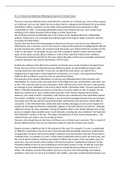AC 2.4: Assess Key Influences Affecting Outcomes of Criminal Cases
There are many key influences that could affect the outcome of a criminal case. One of these aspects
are witnesses, who are not called into court unless there is a disagreement between the prosecution
and defence. When a witness is on the stand, being questioned and cross-examined is called
‘examination in chief’. A seemingly believable witness may influence the jury, such as Kate Moss
testifying in the widely broadcast Johnny Depp vs Amber Heard trial.
Her testimony seemed so believable due to her nature of not speaking about her relationships
publicly. Furthermore, she seemingly had nothing to gain from lying for Depp’s character, thereby
increasing her believability.
Studies have also found that stereotyping of witnesses by the jury may also be very influential in
affecting the case’s outcome, such as the research conducted by Kaufmann investigating the attitude
of juries towards rape victims. His research found that juries were influenced by the emotions of the
victim on the stand – for example, the jury was more inclined to believe a victim who was visibly
upset on the stand, and less likely to believe a victim if they seemed to hold in their emotions.
The Innocence Project found that of 352 cases where the guilty verdict was successfully overturned,
a witness testimony was found to be flawed in 70% of them.
Another key influence that affects the outcome of criminal cases are the barristers and legal teams.
Firstly, the cost of them is influential because different people can afford different lawyers with
varying experience and expertise. Those who can afford the best lawyers are often from a
background of a high status or have important connections. As a result, a less experienced lawyer
might be able to influence a jury less than an experienced lawyer.
The presence of the lawyers themselves can also be very influential due to their charisma and
watchability. As a result, jurors may want them to be telling the truth, and therefore want their case
to win. This could also lead to juror infatuation, which influences the choice the juror makes greatly.
An example of juror infatuation is the case of Claire Lintott: Christopher Alder, a former paratrooper,
died in 1998 after being left unconscious on the floor of a police station in Hull. An inquest into his
death was carried out in court in 2000, where barrister Leslie Thomas represented his family.
However, juror Claire Lintott's 'infatuation' with Thomas was considered to have potentially tainted
the verdict's credibility. In the 2001 hearing, it was found that messages between the two had been
exchanged since the day that the inquest had ended, and that they had met twice shortly after its
conclusion. In her initial interview, Lintott lied about sending messages as soon as the inquest had
ended, but the judge said that the relationship "appears to be both intimate and intense," although
called her reasons for lying "plausible." During Christopher Alder's trial, Lintott had been one of two
jurors to complain about another juror's racist attitudes, meaning she was considered "an important
and influential" member of the jury. The judge concluded that for that reason among others, "the
claimants have not made a case out of apparent bias."
However, plea bargaining can also have an influence on a criminal case’s outcome. This is a result of
directly affecting what crime you are deemed as guilty for and the sentence you receive.
Experts also play a significant role in the outcome of the case. For example, if a case is complicated
or difficult to understand, the jurors won’t have the specialist knowledge required to understand it.
Consequently, the jurors will trust the expert’s opinions to be true because they don’t know how to
challenge them. An example of a case in which expert testimonies were trusted, yet inaccurate, was
the case of Donna Anthony. Anthony was jailed in 1998 for the murder of her two babies. Over six
years later, she was cleared of the murders and freed from prison. Paediatrician Professor Sir Roy
Meadow testified at her trial, also testifying at several other women’s trials. He told the court that
the chances of two babies dying of natural causes in a family like Donna Anthony's was in in 73
million. His evidence was later discredited, but due to the jury's lack of knowledge surrounding
paediatrics, they saw no reason to not believe this statistic, especially considering that Meadow was





